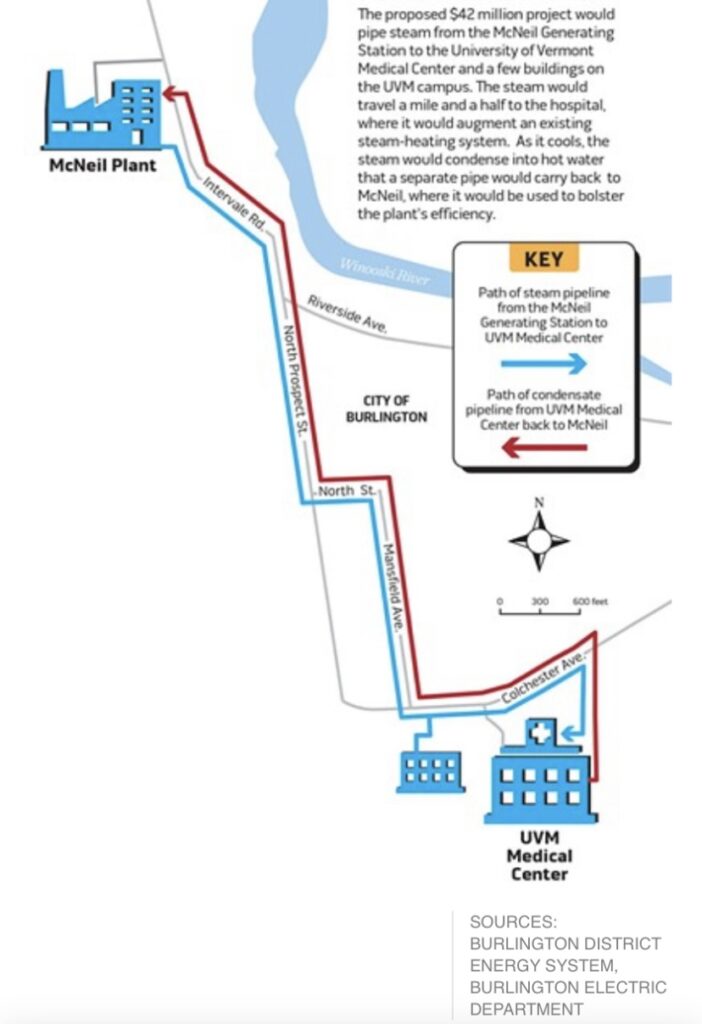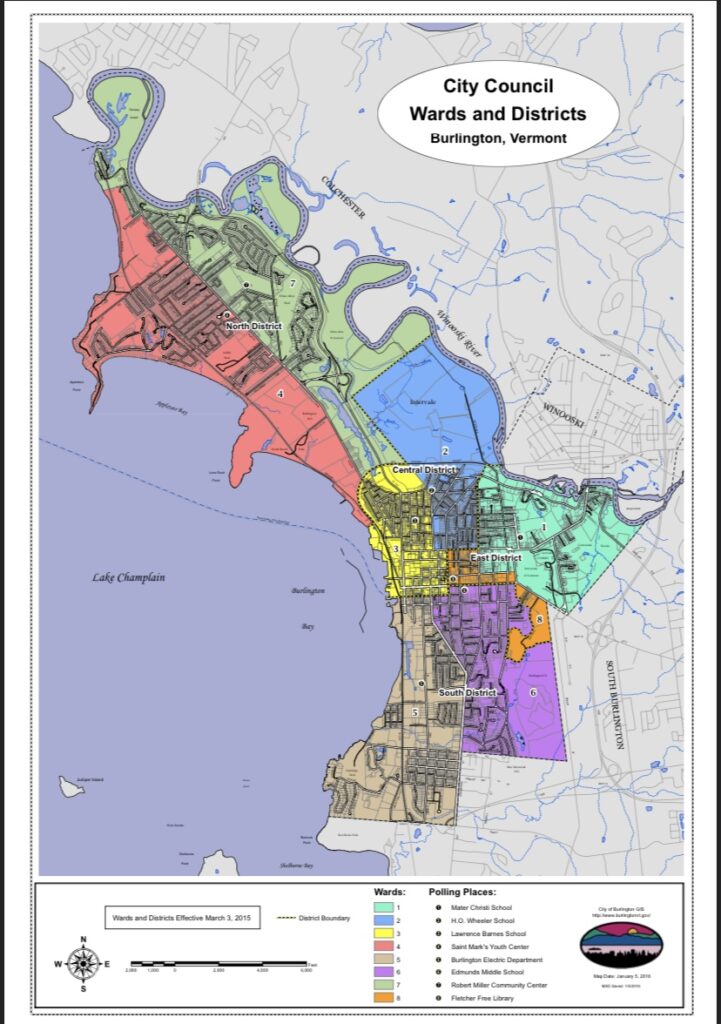
Jack Polatchek l Visual & Online Editor l jpolatchek@mail.smcvt.edu

On Nov. 20, a proposal to expand the Joseph C. McNeil Generation Station was passed in a six to four vote. The project will serve three clients with heat from the McNeil Generating Station: the University of Vermont (UVM), the UVM Medical Center, and the Intervale Center. It is estimated to cost between $40 million to $45 million, according to Darren Springer, general manager of the Burlington Electric Department.
The buildings will be heated by laying an estimated 7,500 feet of 12-inch steam pipe from the McNeil plant to an existing steam line near the hospital. The line will be buried about 30 inches below the existing roads between the plant and near the hospital entrance on Colchester Avenue.
The pipeline will heat the UVM Medical Center, Vermont’s only level 1 trauma center. “McNeil represents a huge opportunity to reduce commercial natural gas use by 16% while also increasing the efficiency of an existing critical asset in our local wood energy plant,” said the Burlington Electric Department (BED) in a statement on the passing of the McNeil proposal.
“Burlington, Vermont, and New England need McNeil as a reliable, renewable generator of electricity for the foreseeable future, with or without District Energy. If we want to continue to be 100% renewable as a community and support a regional switch to renewability, we need McNeil,” the BED statement added.
Some members of the greater Burlington community see the project as a temporary deterrent to the effects of the impending climate crisis.
Connor Wertz, a member of 350VT, a grassroots environmental organization fighting for climate justice, argued that this is not a viable solution due to the immense amount of greenhouse gas emissions not being disclosed by McNeil. According to Wertz, 350VT believes McNeil is “greenwashing.”
“Greenwashing is simply the act of presenting something as more environmentally friendly than it is for monetary purposes,” Wertz explained.
“Greenwashing has been a decades-old strategy of the fossil fuel industry.
“Companies can present natural gas as a ‘bridge fuel’ that’s good for the environment, and build out huge infrastructure projects that will lock us into gas burning for decades to come.
“In the energy and climate field, we are seeing energy companies greenwash biofuels that still emit significant quantities of greenhouse gas emissions, sometimes more than their fossil fuel counterparts, by naming them as ‘renewable’.”
Wertz and 350VT are accusing McNeil of greenwashing because, despite claims that biomass is a climate-friendly fuel, they say there is a growing body of scientific research that disproves that claim.
A cornerstone of biofuel greenwashing, they say, which is employed in the case of McNeil, is taking advantage of the accounting mechanisms for greenhouse gas emissions to spin the fuel as more climate-friendly than it is said Wertz.
For example, Burlington does not count stack emissions from McNeil, because emissions from biomass are counted at the site of harvest. This enables McNeil to represent a dramatically lower carbon footprint for itself Wertz continued.
“It is like stacking band-aids on top of each other,” said Hayley Jones, the Vermont and New Hampshire director of the environmental advocacy group Slingshot. “It’s like the industry that has caused a lot of these climate and environmental health problems is now proposing the solutions And it’s no coincidence that they’re going to make a heck of a lot of money off of them.”

Councilors Gene Bergman, P-Ward 2; Karen Paul, D-Ward 6; Ali Dieng, I-Ward 7; Mark Barlow, I-North District; Sarah Carpenter, D-Ward 4; and Joan Shannon, D-South District, voted in favor of the project.
Councilors Melo Grant, P-Central District; Zoraya Hightower, P-Ward 1; Hannah King, D-Ward 8; and Joe Magee, P-Ward 3, voted against it. Councilors Ben Traverse, D-Ward 5, and Tim Doherty, D-East District abstained from the vote.
Councilor Bergman of Ward-2 and Councilor King of Ward-8 were the only two councilors to vote differently from their caucuses, King explained. King, a Democratic Burlington City Council member, said that her constituents’ opposition to the decision influenced her vote.
“I felt like a no-vote was what my community advocated for,” King said. “There is a deep concern about if this project is approved, does that mean that the McNeil plant will be around for a lot longer? And I think the reality is that’s true. We didn’t have the votes to vote it down. But I think, in any case, McNeil would still be functioning.”
“We don’t have a solution right now. But the main concern is that building an expansion project, like a steam pipe, just means that McNeil will be around longer, and so that was a reality that I was struggling with,” King continued.
King and Jones felt that this proposal was approved too hastily without further exploration of alternative methods of sustainable heating methods such as geothermal heating, solar energy, and wind power.
A student of Saint Michael’s College and a resident of Vermont, who is not an expert but felt very passionately about the topic commented on the recent proposal.
“While I can recognize that this is not the best solution for staying committed to the climate change cause, and is not the most efficient way to lower the emissions of the hospital, setting up alternative methods to lower the emissions sounds more timely and costly,” they said. “So I view this project as a positive, and a step in the right direction for creating UVM Hospital as a sustainable building.”

